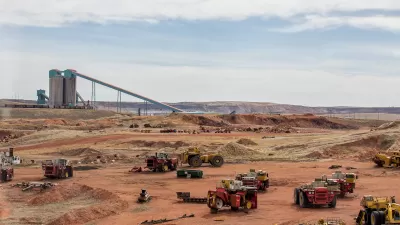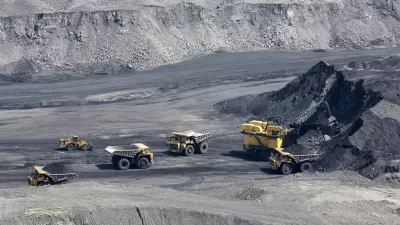The Trump administration's denial of climate change may serve a political purpose, but in the courtroom, it can prove a liability. A federal judge in Montana took into account the administration's "discarding" of climate science in its ruling.

For the second time in three months, the U.S. District Court of Montana dealt a setback to Calgary-based TransCanada Corp. and the U.S. Department of State when Judge Brian Morris, an Obama appointee, on Nov. 9 "blocked all further work on the Keystone XL pipeline, saying the Trump administration had failed to justify its decision to reverse a prior decision by the Obama administration and to approve the tar sands oil delivery project," reports Phil McKenna for InsideClimate News.
"The Department instead simply discarded prior factual findings related to climate change to support its course reversal," states Morris in the 54-page ruling, "Indigenous Environmental Network v. United States Department of State." The ruling blocks construction on the 1,179-mile pipeline within the U.S. that terminates at Steele City, Neb.
The judge's decision underscored the value of the landmark National Environmental Policy Act (NEPA) as a tool for environmentalists at a time when the Trump administration is seeking a wholesale reversal of regulations that limit the use of fossil fuels or reduce the pollution they produce.
President Trump on Friday morning [Nov. 9] called the ruling "a political decision made by a judge. I think it's a disgrace." Trump added that the case will likely be appealed to the Ninth Circuit Court of Appeals and "we're slowly putting new judges in the Ninth Circuit."
Tom Goldtooth, executive director for the Indigenous Environmental Network, was not surprised by the decision.
"This decision vindicates what we have been saying all along: Trump's approval of this pipeline was illegal, violated environmental laws and was based upon fake facts," said Goldtooth.
“We’re thrilled with Judge Morris’s ruling today," said Becky Mitchell, chairwoman of the Northern Plains Resource Council, a conservation and family agriculture group that is a co-plaintiff whose name appears on the lawsuit [pdf].
"In essence, this decision sends TransCanada back to the drawing board. It’s nearly as good a ruling as we could have hoped for – he decided in our favor on almost all of our claims."
A TransCanada spokesperson said the company plans to continue moving forward on the project. "We remain committed to building this important energy infrastructure project," said Terry Cunha.
"The decision could thrust the White House into a contentious new legal battle over climate change," report Coral Davenport and Lisa Friedman in a more comprehensive article on the ruling for The New York Times.
The decision leaves plenty of room for the Trump administration or TransCanada...to appeal. Analysts said that if it did so armed with a deeply researched analysis arguing its position, it could well reverse the finding.
FULL STORY: Judge Blocks Keystone XL Pipeline, Says Climate Impact Can't Be Ignored

Planetizen Federal Action Tracker
A weekly monitor of how Trump’s orders and actions are impacting planners and planning in America.

Restaurant Patios Were a Pandemic Win — Why Were They so Hard to Keep?
Social distancing requirements and changes in travel patterns prompted cities to pilot new uses for street and sidewalk space. Then it got complicated.

Maui's Vacation Rental Debate Turns Ugly
Verbal attacks, misinformation campaigns and fistfights plague a high-stakes debate to convert thousands of vacation rentals into long-term housing.

In California Battle of Housing vs. Environment, Housing Just Won
A new state law significantly limits the power of CEQA, an environmental review law that served as a powerful tool for blocking new development.

Boulder Eliminates Parking Minimums Citywide
Officials estimate the cost of building a single underground parking space at up to $100,000.

Orange County, Florida Adopts Largest US “Sprawl Repair” Code
The ‘Orange Code’ seeks to rectify decades of sprawl-inducing, car-oriented development.
Urban Design for Planners 1: Software Tools
This six-course series explores essential urban design concepts using open source software and equips planners with the tools they need to participate fully in the urban design process.
Planning for Universal Design
Learn the tools for implementing Universal Design in planning regulations.
Heyer Gruel & Associates PA
JM Goldson LLC
Custer County Colorado
City of Camden Redevelopment Agency
City of Astoria
Transportation Research & Education Center (TREC) at Portland State University
Camden Redevelopment Agency
City of Claremont
Municipality of Princeton (NJ)





























